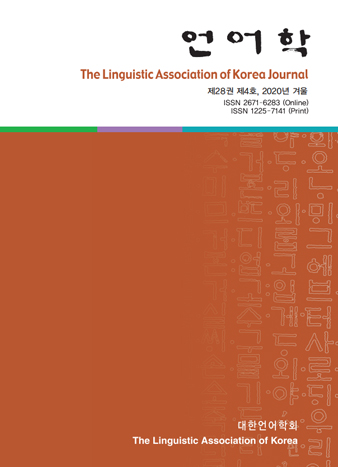대한언어학회 전자저널

28권 4호 (2020년 12월)
- 무능력함을 표시하는 한국인 감사화행 전략의 진실성 연구: 남녀, 연령, 학력에 따른 차이 여부
-
천재윤
Pages : 103-120
Abstract
Cheon, Jae-Yun. (2020). On the veracity of Koreans incompetency strategy in gratitude speech act: Differences in gender, age and educational status. The Linguistic Association of Korea Journal, 28(4), 103-120. This study examined differences in gender, age and educational status to find out the veracity of incompetency strategy in gratitude speech act. In daily life, Koreans often express incompetency in the context where their gratitude has to be expressed. It could mean that incompetency strategy is used to express continuous relationship, particular types of thoughts and value criterion in Korean culture. To prove this point, a survey by questionnaire which consists of psychologically grateful situations was conducted. The findings of the study are as follows. First, there were no significant differences in gender, age and educational status in relation to the veracity of the incompetency strategy in gratitude speech act used by each group. Second, incompetency strategy in gratitude speech act was a general trend in the Korean speech community, especially in psychological situations.
Keywords
# 감사화행(gratitude speech act) # 무능력 전략(incompetency strategy) # 남녀 # 연령 # 학력 차이 여부(differences in gender # age and educational status) # 언어공동체의 보편적 흐름(a general trend in a speech community)
References
- 김숙자. (2005). 한일 양언어의 감사표현 비교. 한국언어문화학, 2(1), 17-32.
- 김정연. (1995). 영한 화행 대조 분석: 감사와 그 반응을 중심으로. 서울대학교 석사학위논문.
- 김창섭. (1995). 영·한 화행대조분석: Gratitude를 중심으로. 울산대학교 석사학위논문.
- 금윤정. (2004). 감사표현에 관한 한일 대조 연구. 계명대학교 석사학위논문.
- 류티엔. (2017). 중국인 학습자를 위한 감사화행 연구: 한·중 감사화행의 대조 분석을 중심으로. 동국대학교 석사학위논문.
- 박은영. (2000). 영어권 한국어 학습자와 한국어 원어민의 화행실현 비교연구: ‘사과’와 ‘감사응답’을 중심으로. 이화여자대학교 석사학위논문.
- 송영미, 미즈시마 히로코. (2002). 한국과 일본의 감사표현 비교연구. 이중언어학, 20, 175-191.
- 안정근. (2015). 한국인의 거절화행 전략: 나이와 남녀차이. 언어학, 23(1), 139-160.
- 안정근. (2019). 한국인의 불평 화행 연구. 언어학, 27(3), 1-22.
- 안정근. (2020). 서비스 상황에서 한국인의 발화 개시 양상. 언어학, 28(1), 1-15.
- 이미순. (2006). 영어와 한국어 감사화행의 성별비교 연구. 울산대학교 석사학위논문.
- 이정복. (2007). ‘감사합니다’와 ‘고맙습니다’의 사회언어학적 분포. 사회언어학, 15(1), 151-173.
- 천재윤. (2011). 영어 모국어 화자의 ‘thank you’에 대한 사회언어학적 연구. 호원대학교 인문사회과학연구 논문집, 14, 119-141.
- 천재윤. (2012). 영·한 감사표현에 관한 연구 - 감사상황을 중심으로. 전북대학교 박사학위논문.
- 천재윤, 문영수. (2010). ‘한국어 고맙습니다’ 화행에 대한 사회언어학적 연구. 언어학, 18(2), 135-161.
- 한후영. (2004). 일본인 한국어 학습자의 감사 화행. 이화여자대학교 석사학위논문.
- Kwon, S. (2000). The frequency of saying thank-you in Korean. The Sociolinguistic Journal of Korea, 8(1), 325-360.
- Lee, J. (2009). A sociolinguistic analysis of Ttaengkyu ‘thank you’ and Ssori ‘sorry’ used in Korean. The Sociolinguistic Journal of Korea, 17(1), 211-236.